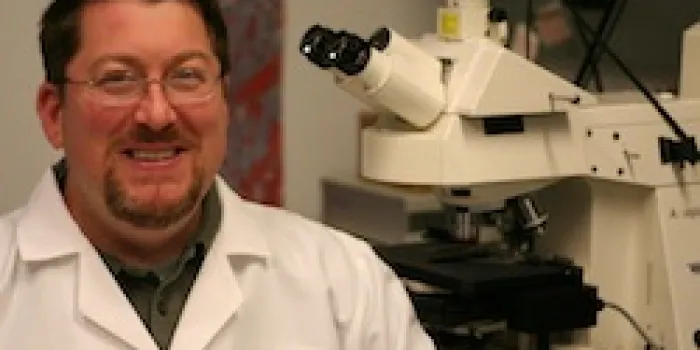HemAware is conducting a series of interviews with recipients of the NHF-Shire Clinical Fellowship. It is funded through the generous support of Shire. The objective of this grant is to increase the number of skilled clinicians committed to providing comprehensive care for individuals with bleeding disorders and to prepare candidates for academic careers.
This interview was conducted with Eric Mullins, MD, assistant professor, University of Cincinnati Department of Pediatrics. He is a pediatric hematologist/oncologist at the Cincinnati Children’s Hospital Medical Center. The fellowship was funded from 2005–2007.
Why did you decide to study medicine?
Mullins was attracted to the basic sciences while in high school in his hometown of Kennett, Missouri. In college, he planned to follow a PhD track in either chemistry or physics. However, the influence of his family physician steered him to pursue an MD at the University of Missouri in Columbia. “Part of the reason my general practitioner (GP) thought it would be a better career path was that you had more possibilities, you weren’t as confined to just one area of science because of the various branches of medicine,” says Mullins. But the GP had an ulterior motive. “He was an old-time physician who thought physicians got treated better than PhDs,” Mullins says with a laugh.
What initially attracted you to hematology?
While doing his residency at the Vanderbilt University Medical Center in Nashville, Tennessee, Mullins started seeing hemostasis patients. “I got interested in them and really found them to be the most fascinating of all the patients that I saw when I was doing my hematology/oncology rotation,” he says. During his last year of residency, Mullins worked with Robert L. Janco, MD, director of the Vanderbilt Hemostasis-Thrombosis Clinic, on his thrombophilia/thrombosis grand rounds. “That really got me interested in hemostasis,” Mullins adds.
How did the training and mentorship you received as an NHF-Shire Clinical Fellow affect your decision to pursue clinical care and/or research in bleeding disorders?
“Having the fellowship allowed me a little extra clinical time to devote to hemostasis, as opposed to being pulled more toward oncology,” the busier side of hematology/oncology services, Mullins says. The fellowship acted as a shield, protecting Mullins from being pulled into oncology like other fellows in the department. “So I got more experience on the hematology side of things. I also had more freedom to see the hemophilia patients during my fellowship.”
The fellowship also gave Mullins the time he needed for research in the lab of Jay L. Degen, PhD. “I’ve been working essentially since then on variations of prothrombin and how they affect diseases other than just thrombotic disorders, like inflammatory disorders.”
Are you still engaged in the clinical aspects of patient care or bleeding disorders research? What aspect of care are you most interested in?
Mullins estimates he has a 20-80 split, dividing his time between clinical care and research, respectively. “Most of my clinical care is devoted to bleeding disorders, as opposed to thromboses or others aspects of hematology.” Twice a month, he teams up with the pediatric gynecology department to conduct clinics for girls and teens with bleeding disorders with menstrual complications. He also conducts a monthly hemophilia clinic with Ralph Gruppo, MD.
Mullins’ research takes up the bulk of his time. “We’re looking at a model of multiple sclerosis (MS) and how prothrombin and fibrinogen affect or exacerbate its severity,” he says. They’re also looking at the interaction between prothrombin and the immune and inflammatory processes that occur with MS.
Did your NHF-Shire Clinical Fellowship assist in advancing your own position at your institution? Or did it serve as a building block to further your career in coagulation?
For Mullins, the fellowship achieved both. “It helped advance my case for staying on as faculty,” he says. “Having the protected time to do hemostasis, as opposed to the general broader hematology/oncology responsibilities, helped keep me in hemostasis.”
Mullins valued the opportunity to attend NHF-related meetings to connect with peers in the field. “The other thing that’s nice about the NHF-Shire Fellowship is the networking.”
Where do you think bleeding disorders research and clinical care may be headed in the near future? In the next decade?
“Factor IX gene therapy is the hottest topic in research right now with regard to hemophilia,” Mullins says. He’s intrigued by the research of Robert R. Montgomery, MD, senior investigator at the BloodCenter of Wisconsin in Milwaukee, who is using gene therapy to induce Factor VIII production in platelets, preventing inhibitor complications.
Longer-acting products from pharmaceutical companies are also interesting, Mullins says, especially those for hemophilia B patients. “So hemophilia B seems to have the edge on the innovations over hemophilia A at the moment,” he says with a chuckle. Medications being developed to treat hemophilia are employing new technologies, which look promising, says Mullins. “There seem to be a lot of potential new avenues that weren’t available before for hemophilia patients.”
When you are not working, how do you relax or “escape” from your work?
Mullins is a die-hard sports fan of his alma mater, Mizzou. Now that the university is in the Southeastern Conference, Mullins has his sports strategy planned. “In the next two years, I’m going to see all the Mizzou football games I can.”
When he’s not cheering on his team, Mullins enjoys hiking in state and national parks with his wife. He also likes cooking. “Since I grew up in southern Missouri, I really like Southern cooking,” he says. He purchased a smoker a year ago and is fine-tuning his technique. “I’ve been working on perfecting the Southern barbeque style—I’ve done several all-nighters to perfect it,” he admits. When asked if sacrificing sleep for the sake of some smoked meat is worth it, Mullins’ replies unequivocally. “Oh, ya. Absolutely.”

